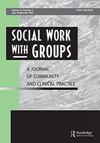将盒子变成支持的圈子:在新冠肺炎大流行期间加强在线小组工作教学
引用次数: 10
摘要
摘要本文反映了14位国际社会团体工作教育工作者的集体经历,他们在向冠状病毒大流行所需的在线教学过渡期间,每周举行一次会议,为期七个月。这些会议是由国际社会工作与团体协会赞助的一个互助支助小组。本文讨论了小组对有效的在线小组工作教育的基本组成部分的看法。它首先回顾了在线社会工作教育的历史。然后,它概述了参与在线小组工作课程规划和开发的关键组成部分。主题包括课程前准备、规范制定和在线课堂中建立社区。与视频会议平台、课程格式、活动、管理在线疲劳、屏幕共享、处理聊天功能、摄像头和休息室相关的考虑因素贯穿始终。本文最后讨论了互助小组作为在线教学工具的使用,并重点介绍了新西兰和纳米比亚两名成员的在线小组工作教学经验。尽管最初对虚拟教学小组工作犹豫不决,但作者认识到,这可以有效地完成,但需要额外的规划,理想情况下,还需要同行和机构的支持。本文章由计算机程序翻译,如有差异,请以英文原文为准。
Turning boxes into supportive circles: Enhancing online group work teaching during the COVID-19 pandemic
ABSTRACT This paper reflects the collective experiences of fourteen internationally based social group work educators who met weekly and virtually for seven months during the transition to online teaching necessitated by the coronavirus pandemic. The meetings functioned as a mutual aid support group sponsored by the International Association of Social Work with Groups (IASWG). The paper discusses the group’s perceptions of the essential components of effective online group work education. It begins with a review of the history of online social work education. It then outlines the key components instrumental in the planning and developing of engaged online group work classes. Topics include pre-course preparation, norm setting, and building community in the online classroom. Considerations related to the video conferencing platforms, course formats, activities, managing online fatigue, screen sharing, handling chat features, cameras, and break out rooms are interspersed throughout. The paper concludes with a discussion of the use of mutual aid groups as online teaching tools and highlights the online group work teaching experiences of two members in New Zealand and Namibia. Despite initial hesitancy to teach group work virtually, the authors recognize that this can be done effectively but requires additional planning and, ideally, peer and institutional support.
求助全文
通过发布文献求助,成功后即可免费获取论文全文。
去求助
来源期刊

Social Work with Groups
Social Sciences-Social Sciences (miscellaneous)
CiteScore
1.30
自引率
0.00%
发文量
22
期刊介绍:
Social Work with Groups is a unique quarterly journal of community and clinical practice, and an important reference publication for those in the social work profession who value and seek to understand the small group. The journal addresses the issues of group work in psychiatric, rehabilitative, and multipurpose social work and social service agencies; crisis theory and group work; the use of group programs in clinical and community practice; and basic group competencies for all social work professionals. The contributions reflect a sophisticated knowledge of the use of the group as a learning medium and a highly developed understanding of instructional technology in the teaching of social group work knowledge and skills.
 求助内容:
求助内容: 应助结果提醒方式:
应助结果提醒方式:


